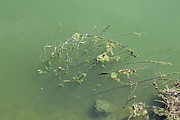Raising crappie in reclaimed sewage water
EPHRATA — It somehow seems appropriate to raise black crappie in treated sewage water.
And that’s what Ephrata does in a giant pond at its water treatment plant on Dodson Road on the very southern reaches of town.
“We’re out here in la la land, and a lot of these plants will pipe (treated) water back into town for lawns and parks,” said Troy Zerb, manager of Ephrata’s Water Reclamation Facility. “We use ours to recharge the groundwater.”
But that’s not all. In addition to four ponds that will allow the treated water to trickle back into the aquifer beneath Ephrata, there is a fifth pond, lined with clay so the water doesn’t seep into the ground, that Zerb said they will fill with treated water and then raise fish in.
“We had this beautiful water coming out of this plant, so we said, let’s do something cool with it,” Zerb said.
By beautiful water, Zebra means the roughly 600,000 gallons of sewage and wastewater the plant treats on a typical day (up to 3 million on a rainy day). The plant filters that water, adds bacteria to break up the solid waste, lets that solid waste settle out, filters the water again, and then treats it with ultraviolet light to kill anything that might remain.
That water — which isn’t potable without one more complex filtration process — is pumped into one of several ponds to either percolate back into the ground or raise fish.
“The ground does that process for you naturally,” said Marc Petersen, a fish biologist with the Washington State Department of Ecology.
But the treated water isn’t the only product Ephrata is able to reuse successfully. Zerb said the facility also produces roughly 75 dry tons a year of composted, dried and somewhat pungent solid waste, which it sells to Boulder Park, an agriculture operation in Mansfield, to use as fertilizer for dry-farmed wheat.
“This is a phenomenal fertilizer,” he said.
Petersen said black crappie are the best kind of fish to raise in reclaimed water. They don’t need a lot of management, they don’t need to be fed, and they keep fairly close to the bottom so birds can’t get to them.
“These are the kind of fish that can survive in this water year round,” Petersen said. “If this was a fish hatchery, it would cost at least $50,000 for two employees, and this is cleaner water than you’d find in most fish hatcheries.”
But the crappie weren’t easy to see on Friday thanks to an algae bloom, which has given the lake a green tint.
“This is a good thing,” Petersen said. “The phytoplankton feeds the zooplankton, which then feeds the fish.”
Later in the year, Petersen said the water level in the fish pond is lowered and the crappie will be “stocked out” to local water bodies like Ping Pond in Ephrata. The city raised and stocked out roughly 2,500 fish last year, he added.
“This is an opportunity for our agency to partner with the city for a common goal,” Petersen said. “We provide them with something to achieve with this water and fishermen with added opportunities.”
Charles H. Featherstone can be reached via email at countygvt@columbiabasinherald.com.





